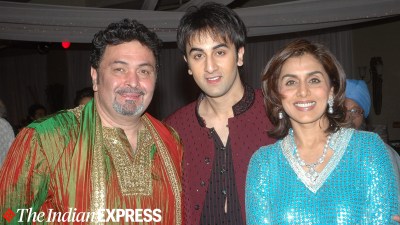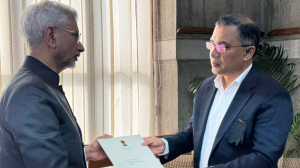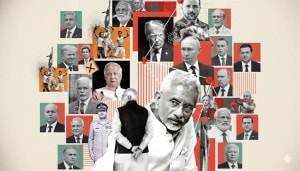The other Article 370
Oh, to be a grey eminence on the Board of Control for Cricket in India. In these depressingly globalised times -- when ridiculous precepts...

Oh, to be a grey eminence on the Board of Control for Cricket in India. In these depressingly globalised times 8212; when ridiculous precepts like accountability and transparency have become the touchstones of administration, in government and in the private sector, in public lives and in personal transactions 8212; where else can one lord upon a thriving, prosperous fiefdom! Where else can one enjoy the luxury of tucking oneself into bed every night secure in the satisfaction that one has effected a wild swing in the nation8217;s mood and self-esteem? And where else can one glibly pass the buck for every despicable act of commission or omission on a bunch of young cricketers lined up like lambs to the slaughter? It is a life so much out of the ordinary, a life so frugally profiled, that even a little meditation on the benefits that complement an association with the BCCI can prove at once deliciously voyeuristic and deeply instructive.
More significantly, it would highlight a glaring incongruity in the Indian state. It would expose an invisible Article 370 in operation in sport governance, whereby rules, regulations and conventions that dictate proceedings in the rest of the country have no bearing on the manner in which the wise old men of Indian cricket operate. Laments about matchfixing and humiliating defeats may echo in Parliament and the corridors of power, but the fact remains that BCCI officials remain laws unto themselves 8212; pompous old men basking in a diplomatic immunity of sorts. Consider, as just one of numerous examples, the BCCI8217;s response to the CBI8217;s report on matchfixing. Admittedly just a tip of the iceberg, this is nevertheless a report that provides a lot of circumstantial evidence on the involvement of vast sections of the cricketing establishment in matchfixing. Moreover, it casts a long dark shadow on the guidance and administration provided by BCCI officials, from their taciturn chief to theirfoot-in-the-mouth-diseased secretary and down to their aides in the state federations. Accountability, after all, does begin at the top, doesn8217;t it? Clearly, not in this case. For these virtuous old men, flogging their rhetoric about cleansing the game, immediately deflected attention from their own culpability and issued a 15-day ban on the five tainted cricketers. And in a tried and tested gambit, they threw cricket lovers another little scrap by appointing a retired CBI official to conduct an inquiry for them.
That the powers that be in the BCCI hold the word of a has-been CBI official appointed by Atilde;sup2;f40Atilde;sup3;them above the detailed report of his former agency 8212; at considerable expense to the taxpayer, one may add 8212; is illuminating. It is evidence of the invisible Article 370. It underlines the fact that the BCCI considers itself above the findings of an investigative agency that in turn has exposed the ridiculous cover-up attempted by the board through the Chandrachud commission. And it is yet again a pointer that a state takeover of the affairs of cricket, however temporary, is imperative. Till the real guilty men of Indian cricket, those who presided over the rot, are not nailed, justice cannot be said to have prevailed.
- 01
- 02
- 03
- 04
- 05































